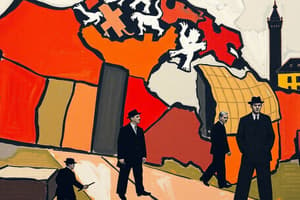Podcast
Questions and Answers
What does the field of economic history examine?
What does the field of economic history examine?
Economic history studies economic events, trends, and systems throughout history, looking into how economic forces shape societies and how societies impact economic systems.
Economic history solely relies on economic theory without considering real-world data.
Economic history solely relies on economic theory without considering real-world data.
False (B)
What are some key questions investigated in economic history?
What are some key questions investigated in economic history?
Key inquiries in economic history often revolve around growth, development, economic fluctuations, institutional influences, and the impact of these factors on societies.
Which of the following is NOT a theme typically explored in economic history?
Which of the following is NOT a theme typically explored in economic history?
Match the historical periods or events with their corresponding themes in economic history:
Match the historical periods or events with their corresponding themes in economic history:
How does economic history benefit from a multidisciplinary approach?
How does economic history benefit from a multidisciplinary approach?
Why is understanding historical patterns relevant to current economic issues?
Why is understanding historical patterns relevant to current economic issues?
Flashcards
Economic History
Economic History
The study of economic events, trends, and systems throughout history, examining how economies shape societies and vice versa.
Primary Source
Primary Source
Original documents or objects from the past, offering firsthand accounts of events.
Secondary Source
Secondary Source
Analysis or interpretation of primary sources, often written by historians.
Historical Methods
Historical Methods
Signup and view all the flashcards
Economic Growth
Economic Growth
Signup and view all the flashcards
Industrial Revolution
Industrial Revolution
Signup and view all the flashcards
Capitalism
Capitalism
Signup and view all the flashcards
Technological Change
Technological Change
Signup and view all the flashcards
Historical Period
Historical Period
Signup and view all the flashcards
Economic Fluctuations
Economic Fluctuations
Signup and view all the flashcards
Study Notes
Introduction to History
- History is the study of past events, particularly in human affairs.
- It encompasses various approaches, including political, social, economic, cultural, and intellectual history.
- Historians use primary and secondary sources to construct narratives and interpretations of the past.
- Historians employ critical thinking to evaluate evidence and develop compelling arguments.
Economic History
- Economic history is the study of economic events, trends, and systems throughout history.
- It examines how economic forces shape societies and how societies, in turn, shape economic systems.
- Economic history builds upon economic theory but focuses on the real-world context and empirical evidence.
- Key questions in economic history often involve factors like growth, development, fluctuations, and institutions.
Historical Methods
- Historical research involves several steps. These include meticulous source selection and evaluation, critically analyzing the material, forming interpretations, and presenting arguments effectively.
- Different historical schools of thought exist, each with distinct approaches to interpreting the past.
- Primary sources provide firsthand accounts of past events, while secondary sources provide analysis and interpretations of primary sources.
Key Themes in Economic History
- Economic growth and development: This theme explores patterns of economic growth and development across different time periods and societies.
- Technological change and innovation: Economic historians examine how technological advancements have affected economies and societies.
- Institutions and their influence on economic outcomes: This theme investigates the role of institutions like governments, markets, and social norms in shaping economic performance.
- Globalization and international trade: How interactions between different economies have evolved over time.
- Economic fluctuations, crises, and recoveries: Examining economic cycles, such as recessions and depressions, and the responses to these events.
Historical Periods and Economic Events
- Agrarian societies and the transition to industrialization: The study of agriculture as the foundation of early economies, changes in agriculture, and the beginnings of industrial activity.
- The Industrial Revolution: Examining the causes, consequences, and impact of industrialization in various countries and societies, including issues concerning technological advancement, social change and the rise of capitalism.
- The rise of capitalism and its challenges: This area examines its evolution, dynamics, and impacts, including periods of economic disruption, inequality, and social unrest.
- 20th and 21st-century economies: Factors impacting economic performance, like global events, technological innovation, globalization, and government policies in the modern era.
Interdisciplinary Nature of the Field
- Economic history draws on various disciplines, including economics, history, sociology, and political science.
- This multidisciplinary approach allows for richer and more nuanced interpretations of past events.
- Historians often use economic theories and models to gain insights into historical trends.
- Economists often consult historical data to provide a realistic grounding for economic theories.
Importance of Economic History
- Understanding historical patterns provides context for current economic issues.
- Providing insight into long-term economic performance patterns.
- Examining how economic and social systems interact is crucial.
- Historical analyses facilitate well-informed decision-making in current economic policies, forecasting, and development strategies.
Studying That Suits You
Use AI to generate personalized quizzes and flashcards to suit your learning preferences.




